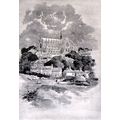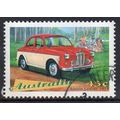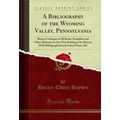Darwen, Lancashire - Sunnyhurst Park - postcard 1978
- Condition : Used
- Dispatch : 2 Days
- Brand : None
- ID# : 138006801
- Quantity : 1 item
- Views : 1375
- Location : United Kingdom

- Seller : justthebook (+1703)
- Barcode : None
- Start : Mon 30 Mar 2015 00:46:19 (BST)
- Close : Run Until Sold
- Remain : Run Until Sold
More Listings from This Seller view all
Seller's Description
- Postcard
- Picture / Image: Sunnyhurst Wood, Darwen, Lancashire
- Publisher: none given but probably Photo Precision (PT18961)
- Postally used: yes
- Stamp: 7p maroon Machin
- Postmark(s): Lancashire July 1978 slogan
- Sent to: Harrington, Workington, Cumbria
- Notes / condition:
Please ask if you need any other information and I will do the best I can to answer.
Image may be low res for illustrative purposes - if you need a higher definition image then please contact me and I may be able to send one. No cards have been trimmed (unless stated).
------------------------------------------------
Postage & Packing:
Postage and packing charge should be showing for your location (contact if not sure).
No additional charges for more than one postcard. You can buy as many postcards from me as you like and you will just pay the fee above once. Please wait for combined invoice. (If buying postcards with other things such as books, please contact or wait for invoice before paying).
Payment Methods:
UK - PayPal, Cheque (from UK bank) or postal order
Outside UK: PayPal ONLY (unless otherwise stated) please. NO non-UK currency checks or money orders (sorry).
NOTE: All postcards are sent in brand new stiffened envelopes which I have bought for the task. These are specially made to protect postcards and you may be able to re-use them. In addition there are other costs to sending so the above charge is not just for the stamp!
I will give a full refund if you are not fully satisfied with the postcard.
----------------------------------------------
Text from the free encyclopedia WIKIPEDIA may appear below to give a little background information (internal links may not work) :
*************
Darwen is a market town and civil parish located in Lancashire, England. Along with its northerly neighbour, Blackburn, it forms the Borough of Blackburn with Darwen — a unitary authority area. It is known locally as ""Darren"", and its residents are known as ""Darreners"". The main road through Darwen is the A666 towards Blackburn to the north and Bolton to the south, and ultimately Manchester.
The town stands on the River Darwen, which flows from south to north and is visible only in the outskirts of the town, as within the town centre it runs underground.
Most authorities trace the name 'Darwen' to the Brythonic derw ""oak"", originally applied to the river; an etymology supported by an older form of the name, Derewent (1208).[2]
The area around Darwen has been inhabited since the early Bronze Age, and the remains of a barrow from approximately 2000 BC have been partially restored at the Ashleigh Barrow[3] in Whitehall. Artefacts including a bronze dagger and urns containing human ashes were found, and a small number of these finds are now on display at Darwen Library Theatre. The Romans once had a force in Lancashire, and a Roman road is visible on the Ordnance Survey map of the area. Mediaeval Darwen was tiny; little or nothing survives. One of the earliest remaining buildings is a farmhouse at Bury Fold, dated 1675.[4] Whitehall Cottage is thought to be the oldest house in the town, and was mostly built in the 17th and 18th centuries but contains a chimney piece dated 1557.[5][6]
Like many towns in Lancashire, Darwen was a centre for textile manufacture during the Industrial Revolution. Samuel Crompton, inventor of the spinning mule, lived there for part of his life.[7] Rail links and the Leeds-Liverpool Canal arrived in the mid-19th century. The most important textile building in Darwen is India Mill, built by Eccles Shorrock & Company. The company was ruined, however, by the effects of the Lancashire Cotton Famine of the 1860s.
Much of the town was built between about 1850 and 1900; placenames, date stones in terraces, and the vernacular architecture of cellars, local stone, locally-made brick, pipework and tiles and leaded glass, the last now mostly gone, reflect this. It was one of the first places in the world to have steam trams. The arrangement of town hall, market, public transport, eating/hotel facilities and the pre-suburban mixed-size vernacular housing, with local variations according to topography, is very characteristic of northern England. The year 1900 perhaps represents the peak of Victorian optimism in the area. The working classes were then much more identifiable as masses than now. George Orwell, for example, described the sound of clogs on cobblestones of the large number of female millworkers.[citation needed] The rise of the Labour Party from about 1900 coincided with a decline in the Liberal Party, which followed the Manchester School in economics, increasingly seen as permitting unjustified exploitation. However, Darwen usually voted for the Conservative Party until a Conservative government made unpopular administrative rearrangements in the early 1970s
Andrew Carnegie financed a public library here; the town also had an art and technology college and a grammar school. In common with many northern nonconformist towns, there are many chapels of assorted denominations, which flourished until the psychological blows of the First World War.[citation needed]
One of Darwen's biggest claims to fame is that it hosted a visit from Mohandas K. Gandhi in 1931. He had accepted the invitation[8] from Corder Catchpool, manager of the Spring Vale Garden Village Ltd,[9] to see the effects of India's boycott of cotton goods. The unemployed mill workers greeted the man with great affection even when they were out of work, as they understood it was not India but greedy and irresponsible mill owners who were responsible for their situation.[citation needed]
India Mill is now home to many companies, including Brookhouse (producers of aeroplane parts) and Capita Group, which runs TV licensing. Since the 1950s, the textile industry has strongly declined in the region, although many industrial buildings from the period survive, now used for other purposes. India Mill and its famous chimney have been sold in a £12 million deal.[citation needed] Among Darwen's other famous industries are Crown Paints, formerly Walpamur Paints,[10] the earliest British paint manufacturer, which actually named one of its paints 'Darwen Satin Finish'. Crown Wallpaper manufactured wallpaper, Lincrusta and Anaglypta in the town. ICI Acrylics (now called Lucite International) was where acrylic glass (Perspex for windows and signage, and Sani-ware or Lucite used for the maufacture of baths and shower trays) was invented; it is still manufactured in two separate plants within the town. Spitfire canopies and (later) coloured polythene washing-up bowls were first made here.[citation needed]
Recently, a large number of homes in the town have been demolished as part of the government's Pathfinder scheme, and there is an ongoing campaign to prevent the comprehensive redevelopment of large areas of the town.
Sunnyhurst Woods
Sunnyhurst Woods was originally owned by the Brock-Hollinshead family and used for hunting stag. The area was later sold to Eccles Shorrock. To commemorate the coronation of Edward VII the land was turned into a public park on 2 July 1903.
type=printed
city/ region=darwen
period=post-war (1945-present)
postage condition=posted
number of items=single
size=standard (140x89 mm)
Listing Information
| Listing Type | Gallery Listing |
| Listing ID# | 138006801 |
| Start Time | Mon 30 Mar 2015 00:46:19 (BST) |
| Close Time | Run Until Sold |
| Starting Bid | Fixed Price (no bidding) |
| Item Condition | Used |
| Bids | 0 |
| Views | 1375 |
| Dispatch Time | 2 Days |
| Quantity | 1 |
| Location | United Kingdom |
| Auto Extend | No |



 for 1 item(s)
for 1 item(s)

















